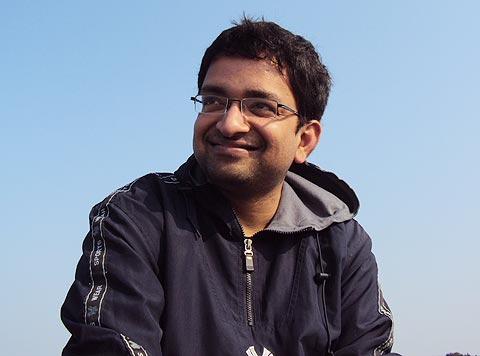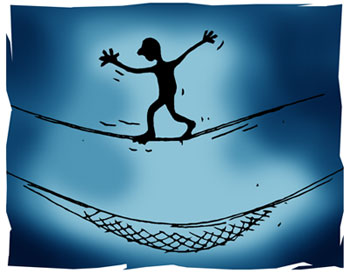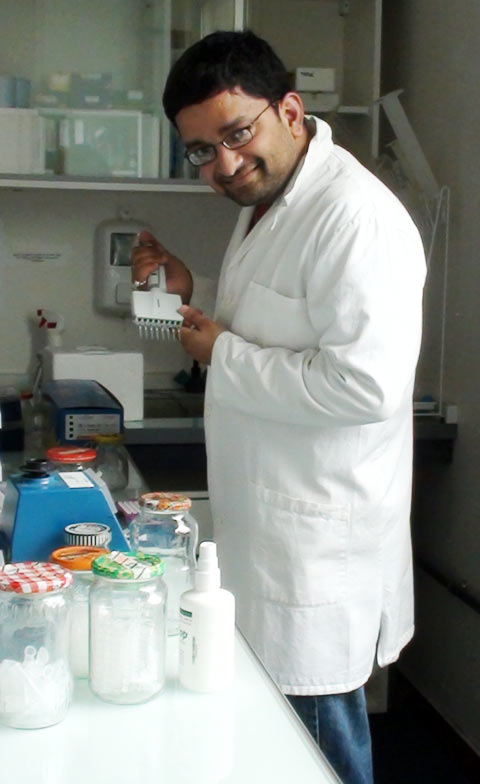 | « Back to article | Print this article |
Meet the Indian who won Europe's biggest scholarship
Alok Arun, who is currently working on his PhD at the Station Biologique de Roscoff in France after winning the Erasmus Mundus -- Europe's biggest scholarship -- is also the only Indian to be part of a global genome project that he says will influence the life cycle of an organism.
It's been over three years since Alok Arun won the Erasmus Mundus Scholarship to study in Europe in 2009.
When he was selected for what's considered the continent's biggest scholarship to pursue his PhD, Alok took his first baby step towards a bigger dream -- "a breakthrough discovery in genetics".
For Alok, who was born in Darbhanga, Bihar and had never travelled abroad, it was a "dream come true" to be chosen from among 16 students across the globe to pursue his PhD in France.
He says it's a "privilege" to study at the Station Biologique de Roscoff, France -- one of the world's best marine laboratories -- where he is currently pursuing his PhD in Developmental Biology and Genomics.
Interestingly, the 28-year-old is also the youngest and the only Indian to be part of a global genome project, whose discoveries and findings he says could lead to curing fatal diseases like cancer in the future.
While Alok may be on his way to unveil a "breakthrough discovery in genetics" and make the country proud of his achievements, very few know that he was once a shy, reticent boy who was afraid of public speaking for a long time.
"I was an average student in school. I was afraid of speaking in public until I reached college," says Alok, who studied at Rose Public School in Darbhanga, Bihar.
He says Hindu College, Delhi where he did his graduation from, is where a large part of his transformation took place.
"When I joined Hindu College, I was not focused on my career. I had seen celebrities and inspiring people only on television and read about them in the newspapers. But during the three years I spent at Hindu College, many famous personalities visited and shared their experiences. I realised how lucky I was to be part of such a prestigious college, where we could interact with successful people from the field of entertainment, politics etc."
Inspired by his newfound realisation, in March 2001, Alok not only participated in his first debate competition, but also overcame his fear of public speaking and returned with the first prize, making everyone proud.
Just when he thought that things were working in his favour, however, he was forced to take a two-year sabbatical from studying because he could not clear the entrance exam to pursue his master's degree -- he failed twice.
But when he set his heart on it the third time, he not only cracked the exam but went on to complete his MPhil in a record 10 months, surprising everyone and setting a shining example for his peers.
Today, Alok is proud to be part of a 48-member International Chondrus Genome Consortium which has successfully sequenced the genome of the first multi-cellular red algae, Chondrus -- a marine alga he says has immense economical and medicinal values.
After gaining some experience, he plans to return to India so that he can use his knowledge to support and improve fundamental research in the country.
While Alok's father Dr Parmanand Jha teaches English at CM College in Darbhanga, he attributes his success to his mother Renu Jha, a housewife with whom he also shares a special bond.
"My mother has been supportive and confident about me throughout. She has been the only one who never gave a second thought about making tea at 2 am if I was studying. She not only helped me evolve as a good student, but also as a good human being," says the international achiever.
In this interview with Divya Nair, Alok Arun tells us more about how he overcame his fear of public speaking, the inspiration behind his success, his plans for the country and more.
Please click NEXT to continue reading...
'The biggest challenge in life is to overcome fear and the only way to do so is to face the fear'
What do you think are the three things that really helped you win Europe's biggest scholarship?
According to me, the three things that helped me were desire supplemented by confidence, focus, and the wishes of my parents, teachers and the Almighty.
How did you overcome your fear of public speaking?
During my school days, I was shy and was afraid of talking in public. When I was in the first year of my bachelor's programme, I got a chance to attend a conference where Prof Deepak Pental (ex-Vice Chancellor, Delhi University) was speaking.
At the end of his talk, I somehow mustered up the courage to ask my first question. I had never spoken amidst a large crowd before. So I had this fear that the question I ask might sound stupid. But when I spoke, Prof Pental said that it was a very good question. His words boosted my confidence. Since then, I have never hesitated to talk.
Over the years, I have realised that you can solve any problem in today's world through effective communication. The biggest challenge in life is to overcome fear and the only way to do so is to face the fear.
You had to take a two-year sabbatical after your graduation. What do you think went wrong? How did you overcome failure?
The first year, when I appeared for the entrance exam, I was over-confident. Probably that's why it did not work for me. The second time, there was immense pressure to perform, since I had already lost a year. So I could not concentrate and failed again. The third time I decided to take it easy. I did not stress with my preparation and it worked for me.
Even while doing my PhD, in my second year, I scored the lowest marks in Genetics. I scraped through the term with passing marks, ie 33 percent. That when I decided to make it my strongest subject in future and I believe I have been successful in doing that.
You had never travelled abroad before. Were you nervous or excited on your first trip?
It was a culture shock experience for me. I did not know French. Besides, I was part of a team that had students from different parts of the world who spoke different languages. I also had trouble adapting to the local cuisine. It took me a few weeks to accept the new environment and adapt accordingly. Thanks to this trip, I made new friends and also managed to learn some French. I think every student in India should at least try to travel abroad and experience the difference for a few months. It will not only help them learn something new, but it is also a great opportunity to share and exchange our culture and ideas with the rest of the world.
Illustration: Uttam Ghosh
'My research can help prevent the spread of fatal diseases like cancer'
Can you tell us more about the project you are working on? How do you think it will help people?
I am currently studying the regulation of genes in plants and animals. Although our team has been successful in sequencing the first multi-cellular red marine algae, I am working to find out how cells multiply on their own.
We all know how a single cell (haploid) sperm and egg come together to give birth to a diploid organism (human beings). I wanted to study this cycle -- from haploid to diploid and vice versa -- and the factors that regulate this development of cells in both plants and animals.
If I am able to identify the transformation and regulation of genes in organisms, it can also help us prevent the spread of fatal diseases like cancer.
Kindly share your experience of studying at the Station Biologique de Roscoff. How do you think it is different from studying in India?
While India focuses on advanced research, institutes like the Station Biologique de Roscoff offer opportunities to pursue fundamental research, which interested me. Currently, I am working with students from countries like Poland, Greece, England, Belgium, Germany and Russia, so there is a healthy exchange of ideas and the exposure is largely international.
In the few years that I have worked in India, I realised that research funding was sparse and more time was spent doing paper work. We have to submit a report of our development every two months, leaving us little time for research. Here, we have smooth funding and less distraction.
Also, in this institute, we get enough time to contribute in the form of publications and other opportunities, which is very important for a researcher. The biggest advantage is that I get to complete my PhD in three years, which would take nothing less than five years had I done it in India. I will use the time thus gained to gain some work experience.
How do you think life has changed for you in the last two years?
Life has changed in terms of future work opportunities. In addition, this exposure to a new culture has helped me enrich my knowledge at a non-scientific level as well.
These last two years have also helped me give some thought to the line of work I will take up in future.
What are your career plans?
I want to start a laboratory in India. My focus will be on developing marine plants on a massive scale for commercial purposes.
The aim is to generate employment and also boost the economy.
Meanwhile, I would like to continue my research activities. Internationally, researchers are already exploring the sea as an option for fuel and food. I would like to accelerate this work in India as well.
'If you're determined, you'll achieve your goal even in the most adverse conditions'
What do you think are the common mistakes young people make in their careers and how do you think they can avoid them?
Most young people suffer from a lack of academic confidence.
It is very important for students to try and realise their individual potential and interests. The earlier you decide upon your dreams, the easier the path will be for you. Everyone is uniquely talented and once you start exploring the talent within you, your opportunities will increase manifold.
What tips would you like to share with readers who would like to apply for a scholarship to study abroad?
- When you are applying for an international scholarship abroad, always remember that students from all over the world are applying too. So you have to put your best foot forward. List your achievements, your interests, skills and how you plan to make use of your education in future.
- You must give sufficient time to filling your application.
- Watch out for grammatical and factual errors.
- Your application reflects your personality on paper. You need to be focused, organised and dedicated.
Kindly share some dos and don'ts for students to strengthen their CVs while sending an application abroad.
You must:
- Do the homework for an application very carefully. Understand what is required of you as a candidate and cater accordingly.
- Limit your CV to a minimum number of pages.
- Be honest in your letter of motivation.
- Apply well in advance; don't wait for the deadline.
- Proofread your CV several times before the final submission.
You must not:
- Copy even a single line from anywhere (website, books etc). This is plagiarism, which is a serious offence.
- Put unnecessary information in your CV (for example, if you are applying for a Masters in Biotechnology, there is no need to put in your CV that you are a great dancer, unless you have some achievements worth mentioning).
What tips would you like to share with students who want to study abroad?
Studying abroad is fun and challenging simultaneously. Choose your universities and courses very carefully. If possible, write in brief to the course coordinators of the respective universities with your queries.
Always keep your options wider and do not restrict yourself to one country.
What books or websites would you like to recommend to young readers?
Indomitable Spirit by Dr A P J Abdul Kalam is my favourite book. It talks about self-realisation and inspires you to create a niche for yourself. I also recommend The Alchemist by Paulo Coelho, because it sends out a strong message that if you are determined, you will achieve your goal even in the most adverse conditions.
What advice/message would you like to share with our readers?
I wish the readers all the best in their future endeavours. I shall be happy to answer their questions and help them in the future.
Illustration: Uttam Ghosh



